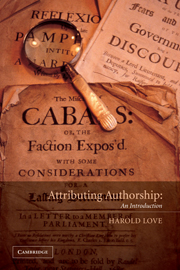Book contents
- Frontmatter
- Contents
- Acknowledgements
- List of abbreviations
- Introduction
- 1 Individuality and sameness
- 2 Historical survey
- 3 Defining authorship
- 4 External evidence
- 5 Internal evidence
- 6 Stylistic evidence
- 7 Gender and authorship
- 8 Craft and science
- 9 Bibliographical evidence
- 10 Forgery and attribution
- 11 Shakespeare and Co.
- 12 Arguing attribution
- Notes
- Select bibliography
- Index
3 - Defining authorship
Published online by Cambridge University Press: 22 September 2009
- Frontmatter
- Contents
- Acknowledgements
- List of abbreviations
- Introduction
- 1 Individuality and sameness
- 2 Historical survey
- 3 Defining authorship
- 4 External evidence
- 5 Internal evidence
- 6 Stylistic evidence
- 7 Gender and authorship
- 8 Craft and science
- 9 Bibliographical evidence
- 10 Forgery and attribution
- 11 Shakespeare and Co.
- 12 Arguing attribution
- Notes
- Select bibliography
- Index
Summary
‘Authors’, Mark Rose proposes, ‘do not really create in any literal sense, but rather produce texts through complex processes of adaptation and transformation.’ The study of the practice of such transformations is different from the study of ‘authorship’ as ‘a free creative source of the meaning of a book’, which, Diane Macdonnell avers, ‘is not a concept that exists within discourses that have developed recently’. James Clifford reports that ‘The general tendency in modern textual studies has been to reduce the occasion of a text's creation by an individual subject to merely one of its generative or potentially meaningful contexts.’ Yet Edward Said, for one, demurs from this orthodoxy:
Textuality is considered to take place, yes, but by the same token it does not take place anywhere or anytime in particular. It is produced, but by no one and at no time. It can be read and interpreted, although reading and interpreting are routinely understood to occur in the form of misreading and misinterpreting…. As it is practiced in the American academy today, literary theory has for the most part isolated textuality from the circumstances, the events, the physical senses that made it possible and render it intelligible as the result of human work.
To identify authorship as a form of human work is to validate individual agency.
- Type
- Chapter
- Information
- Attributing AuthorshipAn Introduction, pp. 32 - 50Publisher: Cambridge University PressPrint publication year: 2002
- 2
- Cited by



